Happy Friday! Upon hearing that Beyoncé is expected to perform at a Kamala Harris rally today—for real this time—all of us have put in last-minute requests to work on Dispatch Politics.
Quick Hits: Today’s Top Stories
- Florida Attorney General Ashley Moody filed a lawsuit Wednesday against U.S. Attorney General Merrick Garland. In the suit, Moody accuses the federal government of trying to block Florida’s investigation into the disrupted September 15 attempt on former President Donald Trump’s life, in violation of the Tenth Amendment. The lawsuit also claims that federal officials told state investigators to stand down—based on a federal statute regarding investigations into crimes against major public figures—before the alleged would-be assassin had been charged with an attempt to shoot the president. “Every day that Florida is prevented from investigating, the State’s case becomes harder to prove at trial,” the suit read.
- The Turkish military on Wednesday night ramped up airstrikes against what it described as Kurdistan Workers Party (PKK) militants in northern Syria and Iraq. More than 35 PKK targets were hit, killing close to 60 people according to the Turkish defense ministry. Turkey’s government had previously blamed the Kurdish separatist organization for a terrorist attack on a state-owned defense company in Ankara on Wednesday that left five dead and more than 20 wounded. No group has yet claimed responsibility for the attack.
- The Wall Street Journal reported Thursday that earlier this year, Russia provided the Houthis—an Iranian-backed, Yemen-based terrorist group—with satellite data they used to target vessels in the Red Sea with drone and rocket attacks. Moscow reportedly provided targeting data via members of Iran’s Islamic Revolutionary Guard Corps embedded with the Houthis, allowing the group to disrupt international trade through its repeated attacks on commercial vessels in the busy waterway.
- President Joe Biden on Thursday issued the first national security memorandum on artificial intelligence, ordering federal agencies to expand their adoption of AI while also setting limits on its use. The memo orders government agencies to help protect U.S. companies’ AI technology from theft by foreign spies and requires them to conduct studies on the potential uses for or regulations on AI. The memo also establishes guardrails on AI’s deployment, stipulating, for example, that it should not be used to limit free speech or as a part of a system for deploying nuclear weapons.
- Canadian Prime Minister Justin Trudeau announced Thursday his government planned to reduce the number of immigrants allowed into the country in the coming years, cutting its annual target of new permanent residents from 500,000 people next year to 395,000, with reductions set to continue. Trudeau—whose ruling Liberal party is trailing the Conservatives ahead of parliamentary elections next year—admitted error in his previous policy, saying, “between addressing labor needs and maintaining population growth, we didn’t get the balance quite right.” The changes are meant to functionally pause Canadian population growth to ease the strain on the healthcare system and allow time to remedy a housing shortage.
- The Department of Justice on Thursday announced that it had reached a settlement agreement with the shipping companies that owned and operated the Dali, the tanker that malfunctioned and crashed into Baltimore’s Francis Scott Key Bridge earlier this year. The deal will see the Singaporean companies pay more than $100 million in damages to be dispersed to the federal agencies impacted by the bridge collapse. The state of Maryland and others—likely including the families of the six construction workers who died in the accident—will seek damages separately from the federal suit.
- Machinists at aeronautics company Boeing voted on Wednesday to reject the latest contract proposal, prolonging the almost six-week-long strike of 33,000 workers on the West Coast. The new contract would have provided a 35 percent pay raise, a $7,000 signing bonus, and increased health and retirement benefits, but it was voted down by 64 percent of the union members and follows the even greater rejection of a proposed deal last month.
A Hug or a Handshake?
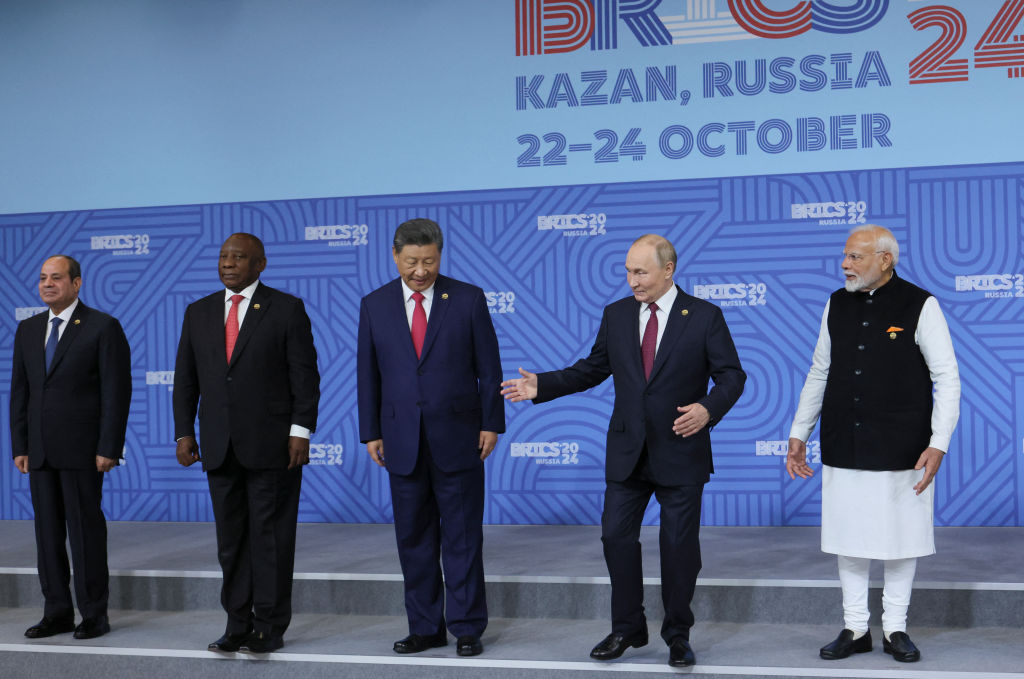
At the opening of the BRICS summit in Kazan, Russia, this week, Russian President Vladimir Putin’ and Indian Prime Minister Narendra Modi engaged in an awkward handshake-to-bro-hug ballet. It was a fitting encapsulation of how the yearly meeting of “developing world” countries went: While many countries are still more than willing to engage with Putin’s regime, the embrace is at least a little uncomfortable.
Putin seeks to use events like the BRICS to begin building an anti-Western, or, as he would put it, “multilateral” international system. But the events of the last several days in Kazan, while demonstrating that Putin is not necessarily alone on the world stage, also showed that his more grandiose aims are likely out of reach.
The annual summit, now in its 16th year, began as an effort to formalize the multilateral cooperation between prominent developing and middle-income nations, known by their initials as the “BRICS”: Brazil, Russia, India, China, and South Africa. The bloc has expanded to include Iran, Egypt, Ethiopia, and the United Arab Emirates. Saudi Arabia’s acceptance of formal membership is going through a “delay”—likely an equivocation to avoid angering its partners in the West. In total, the leaders of 36 countries were in attendance, and Russian foreign affairs adviser Yuri Ushakov hailed it as Russia’s “largest foreign policy event ever held.”
Putin has lofty goals for the convocation. The Kazan Statement, the official declaration of the summit released on Wednesday, proclaimed “the emergence of new centres of power, policy decision-making and economic growth, which can pave the way for a more equitable, just, democratic and balanced multipolar world order.” Translated into plain English, it’s a semi-veiled shot at the rules-based liberal international order, which many countries in attendance view as overly Western-centric.
Rebuilding the world order might not be particularly realistic, but gathering world leaders in Russia to demonstrate that Moscow is not quite an international pariah would likely meet the minimum threshold for success in Putin’s book, Robert E. Hamilton, head of Eurasia research at the Foreign Policy Research Institute, told TMD. “I think he’ll get that because you not only have the five initial BRICS, but you’ve got the new members and a dozen or more partner countries who are there,” he said.
But as for his larger goals of reorienting global finance and aligning BRICS countries against the West? “I don’t really see them making much progress on that front,” said Hamilton. “To really steer the BRICS in the direction of being not just an alternative to the rules-based order, but to turn it in an explicitly anti-Western direction? He’s not going to get that either.”
At the summit’s opening on Wednesday, Putin proclaimed his belief that he was overseeing the rise of a new international community. BRICS “meets the aspirations of the main part of the international community, the so-called world majority,” he said.
Does BRICS represent the world majority? Not quite, but it’s close: Collectively, its member nations make up 45 percent of the world population, dominated by the behemoths of China and India. It punches with less weight in the world economy, making up only about 35 percent of the world’s total GDP. In contrast, the G7, made up of the U.S., Canada, the United Kingdom, Germany, France, Italy, and Japan, represents only 10 percent of the world’s population but generates 30 percent of its GDP.
Putin seeks to steer the BRICS away from the international financial system, at least in part because he’s currently on the outside looking in. That means developing an alternative to the SWIFT system of international financial transfers—from which Russia was removed after the invasion of Ukraine—increasing trade between BRICS countries, and even moving away from reliance on the U.S. dollar as the global reserve currency.
For heavily sanctioned countries—like Iran and Russia—the ability of Western countries to lock them out of SWIFT is a major obstacle. A so-called “non-discriminatory” system would greatly ease the ability of Russia and its allies to cooperate in avoiding international sanctions and to circumvent the global reliance on the dollar as the preferred form of currency.
At first glance, it may seem that the summit made progress on that goal, represented in the Kazan Statement. “We recognise the widespread benefits of faster, low cost, more efficient, transparent, safe and inclusive cross-border payment instruments built upon the principle of minimizing trade barriers and non-discriminatory access,” the parties wrote.
Chinese President Xi Jinping was on board, at least notionally, in his official speech to the summit. “The current developments make the reform of the international financial architecture all the more pressing,” he said. “We should deepen fiscal and financial cooperation, promote the connectivity of our financial infrastructure, and apply high standards of financial security.” It’s a clear statement of China’s overall strategic goal of undermining the Western-backed international order.
But goals and reality may not be the same thing. “The Kazan declaration stops well short of what he’s calling for in that speech,” Jeremy Chan, a senior analyst for China and North Asia at the Eurasia Group, told TMD. Chan pointed out that while countries like China, Russia, and Iran may have very strong incentives to build systems that get around Western sanctions, many other BRICS members do not. “I don’t think Delhi and Brasilia are after that,” he said. “I don’t think they want full decoupling from the international financial system, particularly the U.S.-led one.”
Indeed, one fundamental problem facing the BRICS is that, as it expands, finding unity of purpose becomes even more convoluted. Original members like Brazil and South Africa do not necessarily have objections to the Western-led order and often have fundamentally opposed strategic goals to new members like Iran and Egypt. For example, both Egypt and South Africa desire the creation of a permanent seat representing Africa at the U.N. Security Council—and naturally, also want to be the country to fill it.
But the summit has already resulted in at least one development that may undercut the idea that BRICS is a house divided against itself. It appears that China and India made strides toward resolving their conflict over their disputed Himalayan border, where both countries regularly send armed patrols. In a bloody skirmish in 2020, Indian and Chinese soldiers exchanged their first fire in decades, resulting in the deaths of soldiers on both sides and troop surges to the contested border.
But a meeting between Modi and Xi on the sidelines of the summit, the first since 2019, may signal a thaw. The exact details are unclear, but it seems that, while the two countries have not formally agreed on where exactly the border is, they have agreed to set the size and the schedules of their militaries’ patrols. This could make clashes between the two sides less likely.
Maintaining uniform international opposition to powers like Russia, China, and Iran, then, is a complicated task for the U.S. and the West. India, as a member of the “Quad” security dialogue which also includes Japan, Australia, and the United States, had seemed poised to be the cornerstone of a coalition that seeks to contain Chinese aggression. The India-China detente potentially cuts, at least partly, against that assumption.
It’s not just India that’s difficult to keep onside in a pitched battle between the West and its more autocratic adversaries. President Recep Tayyip Erdoğan of Turkey was the only NATO leader who took part in the BRICS proceedings. In fact, Turkey—always a singular, if not downright unreliable, Western partner—formally asked to join the bloc in September, reportedly over frustration with its inability to join the European Union.
Erdoğan has repeatedly referred to Putin as “my dear friend” in recent years, exasperating Western leaders. While it has sold weapons to Ukraine, Turkey has also refused to join in on Western sanctions against Russia and still officially defends its decision to purchase the S-400 air defense system from Russia—even as it tried to finagle U.S. approval for upgrades to its U.S.-made F-16 fighter jet fleet, seemingly in exchange for lifting its hold earlier this year on Sweden’s NATO membership.
Still, with the motley crew assembled in Kazan, grand strategic goals seem largely out of reach for the BRICS countries. That may be a key for understanding the future direction of the BRICS: While it produces occasional moments of anti-Western sentiment and allows for countries like Russia to try to build alternative multilateral mechanisms, it’s highly unlikely to become a comprehensive anti-Western force.
“I would say that frankly, the more it expands, the harder it will be for it to make resolute decisions; the more members it has, the less unity it will have,” Hamilton of FPRI told TMD. Resolute decisions in a world of tradeoffs and competition are hard. Perhaps the world leaders assembled in Russia can start by deciding if they are going to go with handshakes or hugs.
Worth Your Time
- What’s the next step for artificial intelligence? “Over the past year, the biggest players in AI have been making versions of the same claim: that ‘agents’—systems given some degree of autonomy to complete tasks on behalf of their users—are the next step for the industry,” John Herman reported for New York magazine. “Different firms have different definitions for the term and ambitions for the concept, but the basic idea is pretty intuitive. Real, useful AI automation isn’t possible until models can interact with the real world, not just with users in a chat window. … What’s impossible to ignore about features like this in practice is that they demand huge amounts of access in order to function, a tension that’s going to become more evident as tech companies get more ambitious with AI tools in general. When Google, Apple, Microsoft, and OpenAI talk about the future of AI assistants, more useful chatbots, and the rise of agents, they’re also talking about a world in which they have unprecedented access to the digital matter of users’ lives.”
- Russian occupiers in Ukraine are deporting children to Russia, including disabled young people. “At the beginning of Russia’s brutal occupation of Ukraine’s Kherson region, Hanna Zamyshliaieva took small comfort in the brief phone calls she received from the staff at the Oleshky Specialized Boarding School about her son’s well-being,” Viktoriia Novikova, Nataliia Sirobab, and Ivan Antypenko wrote for New Lines Magazine. “The Oleshky facility, named after the small city in which it is located, was one of the best for disabled people in Ukraine, and Volkovych had thrived under its specialized care for eight years. … In early November, a medical worker from Volkovych’s school reached Zamyshliaieva to tell her the Russians had taken Volkovych and transferred him to another occupied city in the region. She was shocked. No one had asked her permission to relocate her son. It’s been almost two years since that message, and she still does not know where Volkovych is.”
Presented Without Comment
Wall Street Journal: Justice Department Cautions [Elon] Musk PAC on $1 Million Voter Lottery
Also Presented Without Comment
NBC News: Trump, Who Says He Would ‘Fire’ Jack Smith ‘Within Two Seconds,’ Moves to Challenge Special Counsel’s Role in Election Case
In the Zeitgeist
It’s a fairly common occurrence around Dispatch HQ for one of us to send around a new song we like, only to find our colleagues have both already heard it and also enjoy it. Such is the case with the new album from indie singers Andrew Bird and Madison Cunningham—a remake of Lindsey Buckingham and Stevie Nicks’ first album that predates their Fleetwood Mac years. The original, Buckingham Nicks, is basically impossible to find in its entirety. So now we have Cunningham Bird.
Toeing the Company Line
- In the newsletters: The Dispatch Politics team reported from the southwest battlegrounds, Will warned that the government is going to overdo it on tech regulation, and Nick argued (🔒) that the only explanation left for why Harris may lose is that she lacks vision.
- On the podcasts: Sarah is joined by Steve and Jonah to discuss geopolitics and Liz Cheney’s influence on Kamala Harris on The Dispatch Podcast roundtable.
- On the site: Kevin argues that this is the time for escalation in the Middle East, Walter Olson explores the Elon Musk raffle, and Mark Caleb Smith explains the Electoral Count Act of 2022.
Let Us Know
How should the U.S. respond to allies and partners like Turkey and India that seem to play both sides against the middle?



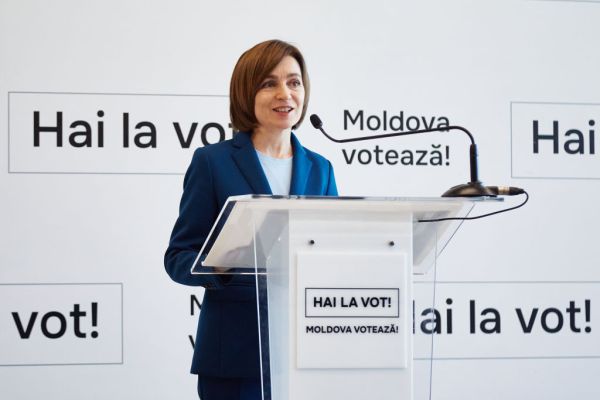
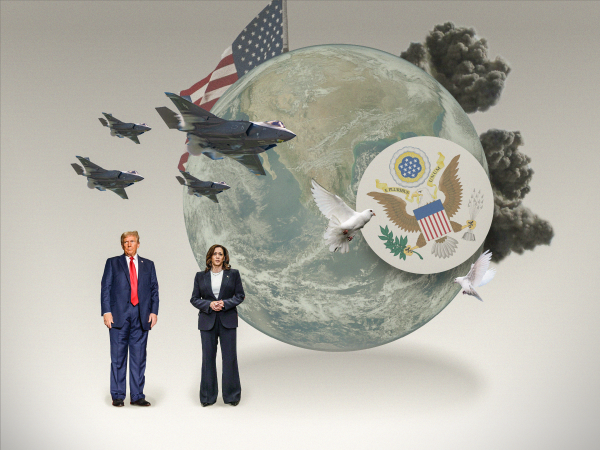

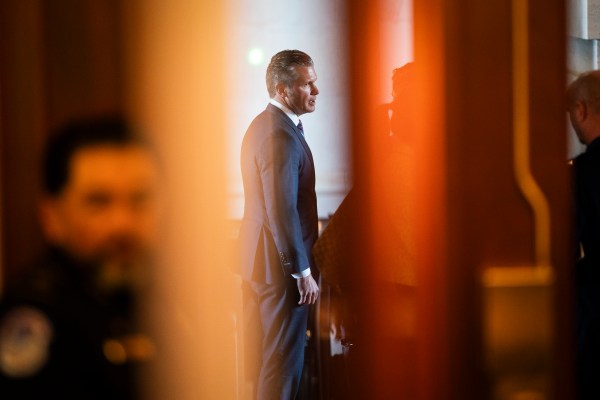
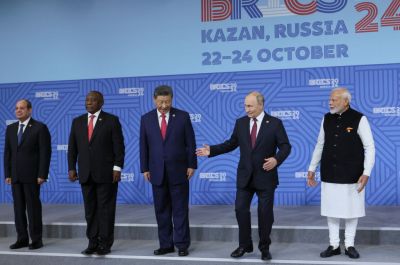
Please note that we at The Dispatch hold ourselves, our work, and our commenters to a higher standard than other places on the internet. We welcome comments that foster genuine debate or discussion—including comments critical of us or our work—but responses that include ad hominem attacks on fellow Dispatch members or are intended to stoke fear and anger may be moderated.
With your membership, you only have the ability to comment on The Morning Dispatch articles. Consider upgrading to join the conversation everywhere.